 US President Barack Obama said that he will not meet the visiting Israeli Prime Minister Benjamin Netanyahu in March, because the Israeli leader’s US trip would be too close to the elections in his country.
US President Barack Obama said that he will not meet the visiting Israeli Prime Minister Benjamin Netanyahu in March, because the Israeli leader’s US trip would be too close to the elections in his country.
“I’m declining to meet with him (Netanyahu) simply because our general policy is (that) we don’t meet with any world leader two weeks before their election,” Obama said in an interview to CNN. “I think that’s inappropriate, and that’s true with some of our closest allies.”
Speaker of the US House of Representatives, John Boehner, had invited Netanyahu to address the Congress in March.
Netanyahu is expected to use that speech to lobby for tough new sanctions against Iran — putting him at odds with Obama, who has threatened to veto additional sanctions as he tried to flesh out a deal to halt Iran’s nuclear programme.
Obama downplayed differences with Israel over his approach towards Iran, saying he has not heard “a persuasive rebuttal of my argument that we crafted very effective sanctions against Iran, specifically to bring them to the negotiation table.”
Israeli intelligence has confirmed that Iran has rolled back its stockpiles of highly enriched uranium, according to Obama.
The US president said imposing new sanctions now would give Iran a way out of the talks, an outcome no one wanted.
“For us, to undermine diplomacy at this critical time for no good reason is a mistake and what we need to do is to finish this round of negotiations, put the pressure on Iran to say ‘yes’ to what the international community is calling for,” he said.
Obama said he was confident that he could successfully lobby the Congress to approve a deal once it’s struck.
“I’ve said before that we will take no deal over a bad deal,” Obama said. “But, if I can prove that the deal we’ve put in place assures us, through indisputable verification mechanisms, that Iran cannot achieve breakout capacity, if I’ve got a bunch of scientists and nuclear experts assuring us that Iran is not on the brink of being a nuclear weapons power, then that’s a public debate we should have.”
“And I will then ask every member of (the) Congress why we would reject that deal and prefer a potential military option that would be less effective in constraining Iran’s nuclear programme and would have extraordinary ramifications at a time when we’ve already got too many conflicts in the Middle East,” he said. “And I’m pretty confident I can win that argument.”